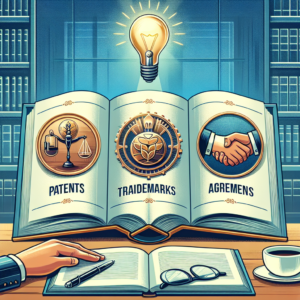Shocking Copyright Court Rulings: Unraveling the Legal Minefield
[caption id="attachment_35121" align="alignnone" width="634"] Intellectual Property[/caption]
In an era where creativity and innovation are paramount, copyright law serves as a crucial framework for protecting the rights of creators and ensuring that their intellectual property is not exploited without permission. However, recent court rulings have sent shockwaves through the legal community, raising questions about the interpretation and enforcement of copyright laws. This article delves into the complexities of copyright law, examines recent landmark cases, and explores the implications of these rulings in a rapidly evolving digital landscape.
Understanding the Basics: What Copyright Law Entails and Its Importance
Copyright law is a legal framework designed to protect the rights of creators over their original works, which can include literature, music, art, and software. It grants authors exclusive rights to reproduce, distribute, and display their creations, thereby incentivizing creativity and innovation. The importance of copyright law lies in its ability to balance the interests of creators and the public, fostering an environment where artistic and intellectual endeavors can thrive. By safeguarding the rights of creators, copyright law not only encourages the production of new works but also contributes to the cultural and economic vitality of society.
Recent Landmark Cases: A Review of Shocking Copyright Court Rulings
In recent months, several landmark cases have emerged that challenge traditional interpretations of copyright law. One notable case involved a popular music artist accused of sampling a lesser-known track without permission. The court's ruling not only upheld the original artist's claims but also set a precedent for how sampling is treated under copyright law, emphasizing the need for explicit permission even for brief excerpts. Another significant case revolved around a major streaming platform facing allegations of hosting copyrighted content without proper licensing. The court's decision to impose hefty fines highlighted the growing scrutiny on digital platforms and their responsibility in protecting copyright holders' rights. These rulings have sparked intense debate among legal experts, artists, and technology companies about the future of copyright enforcement.
The Implications of Copyright Infringement: Legal Consequences Explored
The consequences of copyright infringement can be severe, ranging from financial penalties to criminal charges. When a creator's work is used without permission, they may seek damages through civil litigation, which can result in substantial monetary awards. Additionally, repeat offenders may face statutory damages, which can be significantly higher than actual damages incurred. Beyond financial repercussions, copyright infringement can also lead to reputational harm for individuals and organizations, potentially damaging relationships with collaborators and consumers. As the legal landscape evolves, the implications of copyright infringement are becoming increasingly complex, necessitating a thorough understanding of the law for both creators and users of creative works.
Navigating the Legal Minefield: Key Factors Influencing Court Decisions
Several key factors influence court decisions in copyright cases, including the nature of the work, the purpose of the use, and the amount of the work used. Courts often consider whether the use is transformative, meaning it adds new expression or meaning to the original work, which can be a critical determinant in fair use cases. Additionally, the commercial nature of the use plays a significant role; uses that are for profit are more likely to be scrutinized than those for educational or non-profit purposes. The jurisdiction in which a case is heard can also impact outcomes, as different courts may interpret copyright law differently. Understanding these factors is essential for navigating the legal minefield of copyright disputes.
The Role of Technology: How Digital Media Challenges Traditional Copyright Norms
The rise of digital media has fundamentally altered the landscape of copyright law, presenting new challenges and opportunities for creators and users alike. With the proliferation of online platforms, sharing and distributing creative works has become easier than ever, often blurring the lines of copyright infringement. Technologies such as artificial intelligence and machine learning are also complicating matters, as they can generate new works based on existing content, raising questions about authorship and ownership. Furthermore, the ease of access to vast libraries of content has led to increased instances of unauthorized use, prompting calls for reform in copyright law to better address the realities of the digital age. As technology continues to evolve, so too must the legal frameworks that govern copyright.
Future Outlook: Predictions for Copyright Law in an Evolving Legal Landscape
Looking ahead, the future of copyright law is likely to be shaped by ongoing debates about the balance between protecting creators' rights and fostering innovation. As digital media continues to dominate, lawmakers may be compelled to revisit existing copyright statutes to address the unique challenges posed by new technologies. Potential reforms could include clearer guidelines on fair use, more robust protections for digital content, and enhanced penalties for infringement. Additionally, the rise of decentralized platforms and blockchain technology may offer new avenues for creators to assert their rights and monetize their work. Ultimately, the evolution of copyright law will require a collaborative effort among lawmakers, legal experts, and industry stakeholders to ensure that it remains relevant in an ever-changing landscape.
In conclusion, the recent shocking copyright court rulings have underscored the complexities and challenges inherent in copyright law. As the legal landscape continues to evolve in response to technological advancements and shifting societal norms, it is imperative for creators, users, and legal professionals to stay informed and engaged. The future of copyright law will depend on a careful balancing act that protects the rights of creators while fostering an environment conducive to innovation and creativity. As we navigate this legal minefield, ongoing dialogue and adaptation will be essential to ensure that copyright law serves its intended purpose in a rapidly changing world.
